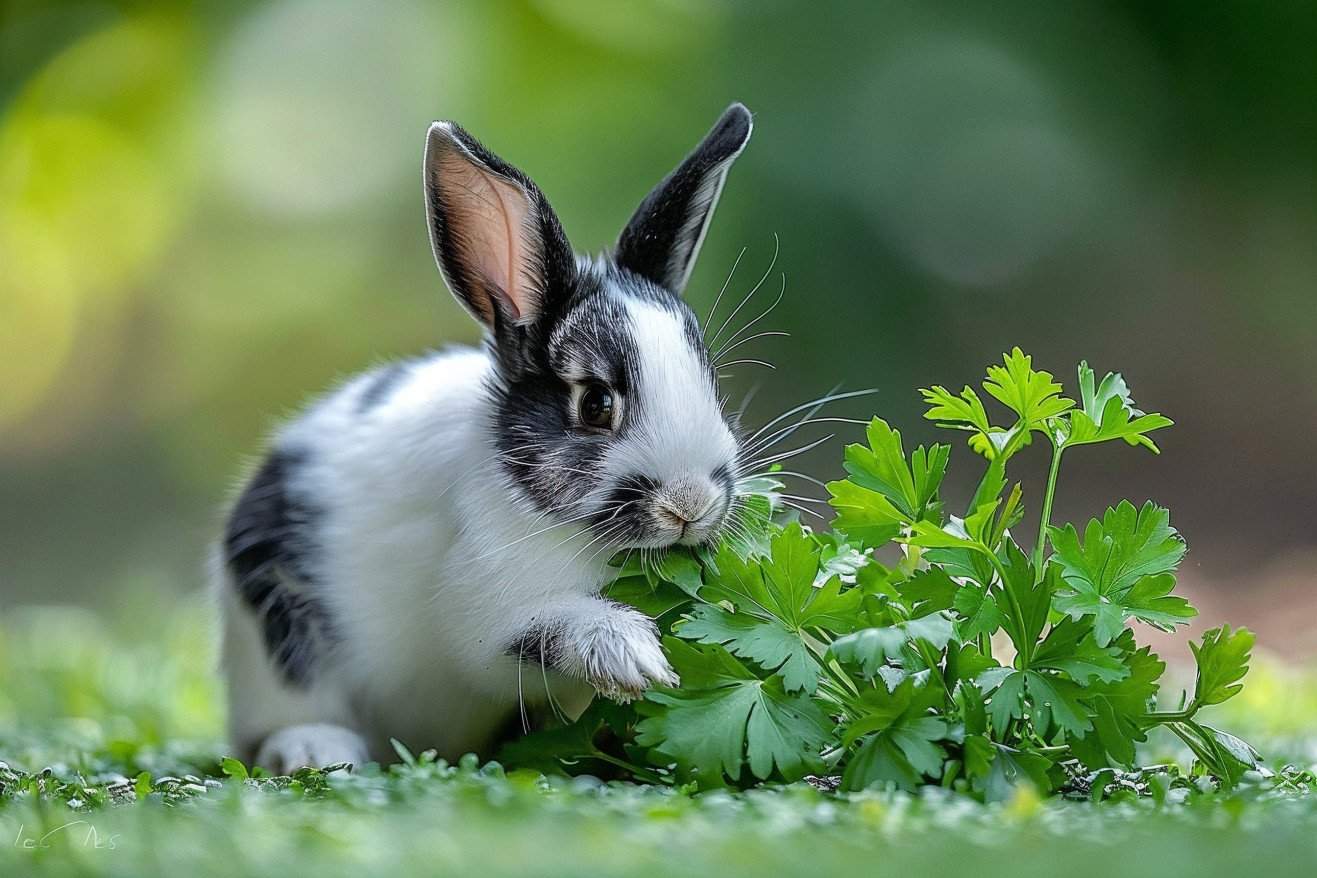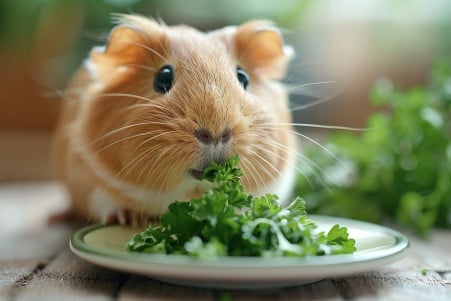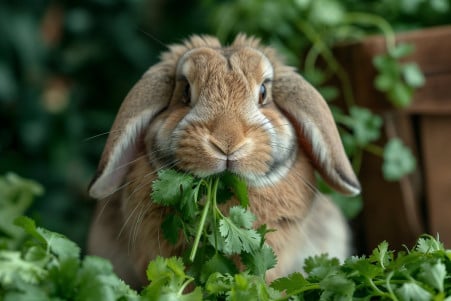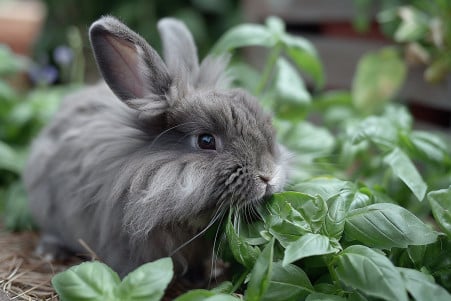Can Rabbits Eat Parsley? A Guide to Safe Feeding Practices
20 February 2024 • Updated 19 February 2024

Parsley is a staple in many human dishes, but when it comes to rabbits, it’s important to know whether or not it’s safe to feed them. In general, rabbits can eat parsley as long as it’s in moderation, and it can be a good source of vitamins A and K.
That said, it’s best to feed parsley to rabbits 2–3 times a week, mix it with other leafy greens, and introduce it slowly to avoid upsetting their stomachs. If you have a rabbit with urinary problems, it’s best to talk to a vet before feeding them parsley.
To help you make an informed decision about whether or not to feed your rabbit parsley, this article will review a range of studies on the topic. This will include information from veterinary nutrition and toxicology research as well as animal welfare recommendations.
By looking at the nutritional value of parsley, what happens when rabbits eat it, and any potential health concerns, we hope to give you a complete overview of whether or not you should feed your rabbit parsley.
Can rabbits eat parsley?
Parsley’s Nutrient Profile and What It Means for Rabbits
Parsley is more than just a garnish; it’s a nutrient powerhouse that can be important for a rabbit’s health. Parsley is high in vitamins A, K, and C, which can help with a rabbit’s immune system, vision, bone health, and blood clotting.
Vitamin A is important for vision and the immune system, while vitamin K is important for bone health and blood clotting. Vitamin C, which is also found in parsley, is important for heart health and the immune system, according to Healthline.
Apigenin, a flavone antioxidant that’s found in parsley in high amounts, has been shown to have anti-inflammatory and antioxidant effects, according to WebMD. This could be especially important for rabbits as they are prone to inflammatory diseases.
It’s important to note, however, that parsley is also high in oxalates, which can cause kidney stones if consumed in high amounts. This means that rabbits that are prone to kidney problems should be careful about how much parsley they eat because the oxalates in parsley can make their kidney problems worse.
While parsley can help lower blood sugar and support kidney health, according to Healthline, its diuretic effects can be problematic, leading to dehydration if not monitored.
When you consider the benefits of parsley’s nutrients and the potential problems with its oxalate content, it’s clear that parsley should be fed to rabbits in moderation.
Parsley in Your Rabbit’s Diet: How to Make Sure Parsley Is Safe
When you first introduce parsley to your rabbit’s diet, it’s best to start with small amounts. A small sprig is enough for the first few servings, so your rabbit can get used to the strong taste and smell of the herb. Pet Keen’s website suggests increasing the amount over time to make sure your rabbit can handle it.
By mixing parsley with other leafy greens, you can not only increase the variety of nutrients but also make sure your rabbit doesn’t eat too much of one thing. A-Z Animals’ website stresses the importance of variety and recommends mixing parsley with other herbs that are safe for rabbits, like basil or mint.
It’s also important to be consistent with how often you feed your rabbit parsley. Two to three times a week is the right amount, as it will give your rabbit the benefits of parsley without overloading them with oxalic acid, which can lead to bladder stones.
It’s also important to talk to your vet before you add parsley to your rabbit’s diet, especially if your rabbit has any health issues. Cottontail Club’s website stresses the importance of getting professional advice so you can tailor your rabbit’s diet to their specific needs.
Finally, it’s important to wash parsley thoroughly to remove any pesticides or other chemicals so you can make sure it’s as healthy as it is delicious. The goal is to make sure your rabbit gets fresh, clean parsley that will keep them healthy.
What Do Rabbits Eat? Fiber Is Key for Healthy Digestion
Fiber is the most important part of a rabbit’s diet and is necessary for their unique digestive systems to work properly. Rabbits are herbivores and need a constant supply of hay or grass, which should make up the bulk of their diet. According to the Merck Veterinary Manual, fiber is not a nutrient but is instead necessary for maintaining gastrointestinal motility and preventing dangerous conditions like GI stasis.
Parsley is high in nutrients, but it also contains calcium, which can lead to urinary tract issues in rabbits if it’s consumed in high quantities. RSPCA says that rabbits with a history of urinary problems should be watched closely when they eat high-calcium foods to ensure that they don’t make any existing issues worse.
Best Friends Animal Society says that to maintain good digestive health and overall health, rabbits should not be fed sugary fruits, legumes, nuts, or other high-calorie treats, which can throw off the balance of their gut microbiome and lead to other health problems.
Preventing diet-related diseases in rabbits requires a healthy diet and regular veterinary care. To keep rabbits healthy and happy, it’s important to know and work within their dietary needs and limitations.
Knowing the Risks: When Parsley Can Be Bad for Rabbits
Despite its many benefits, parsley can also pose some serious risks to rabbits when eaten in high quantities. One of the most serious risks is gastrointestinal stasis, which can be caused by rabbits eating too much parsley. Gastrointestinal stasis is when a rabbit’s digestive system slows down or stops working, and it can be fatal.
In addition to gastrointestinal stasis, overeating parsley can also cause vitamin and mineral toxicity, especially vitamin A. To avoid these issues, Cottontail Club recommends feeding parsley in moderation to rabbits.
Another risk of parsley for rabbits is its high oxalic acid content. If rabbits eat too much oxalic acid, it can cause kidney stones and negatively impact their urinary tract health. A study in the Journal of Veterinary Science notes that rabbits’ diets need to be carefully managed to ensure that they get enough nutrients like folic acid and iron while also avoiding oxalates.
In addition, studies have shown that high-calcium diets can impact renal calcium handling in rabbits, which means that rabbits who are prone to urinary issues should be fed a low-calcium diet. Since parsley is a diuretic, it could make urinary issues worse, so it’s important to pay close attention to how your rabbit responds to parsley.
Many negative reactions can be avoided by monitoring your rabbit’s behavior and health after feeding them parsley. It’s important to watch for signs of distress or discomfort to make sure that parsley continues to be a positive addition to a rabbit’s diet rather than a negative one.
In Conclusion: Parsley and Your Rabbit’s Diet
Parsley is a nutritious herb for rabbits because of its high levels of vitamins A and K, antioxidants, and minerals, but it should be fed to rabbits with caution. As noted by We’re All About Pets, parsley can help rabbits stay healthy, but rabbits with a history of urinary problems should be fed parsley in moderation because of its high calcium and oxalate levels.
It’s important to make sure your rabbit’s diet is well-rounded, and A-Z Animals notes that one way to do this is to mix parsley with other leafy greens. This will help ensure that your rabbit gets a variety of nutrients and will help prevent the problems that can come with too much oxalate and calcium.
Cottontail Club advises that you work with a vet to develop a diet plan that’s tailored to your rabbit’s specific needs, including any health issues, when you’re introducing new foods like parsley.
Rabbit owners should always monitor their pets for any negative reactions when they introduce new foods. In the end, the more you can learn about your rabbit’s diet, the better you can ensure that you’re helping them live a long, healthy life.


